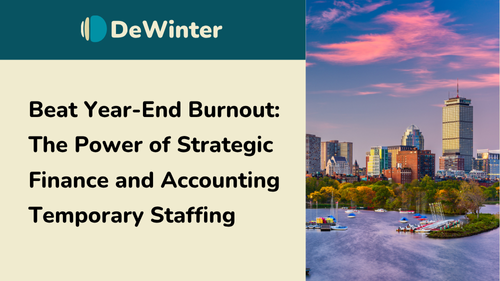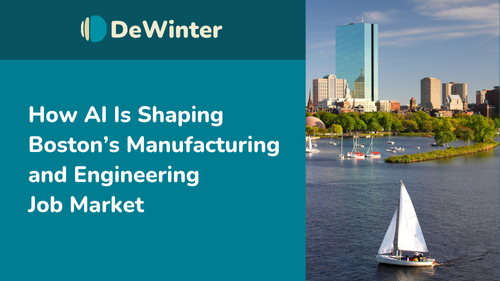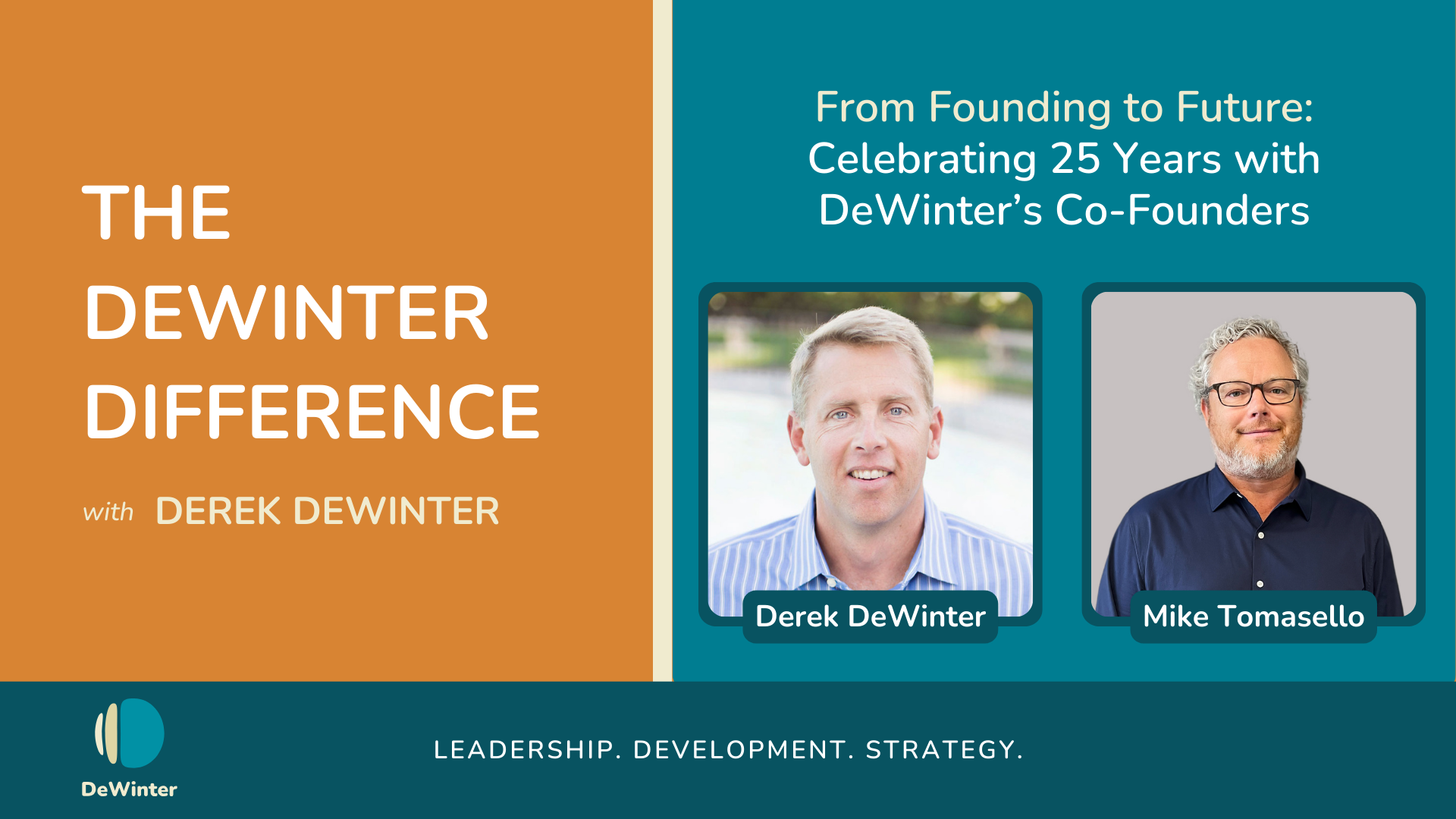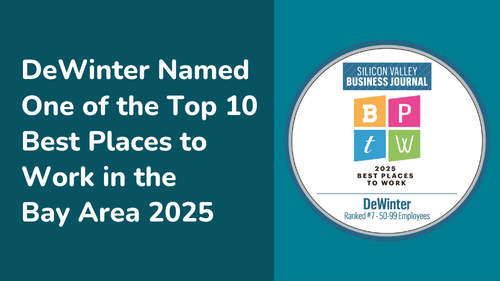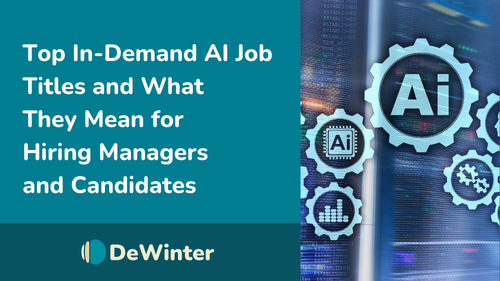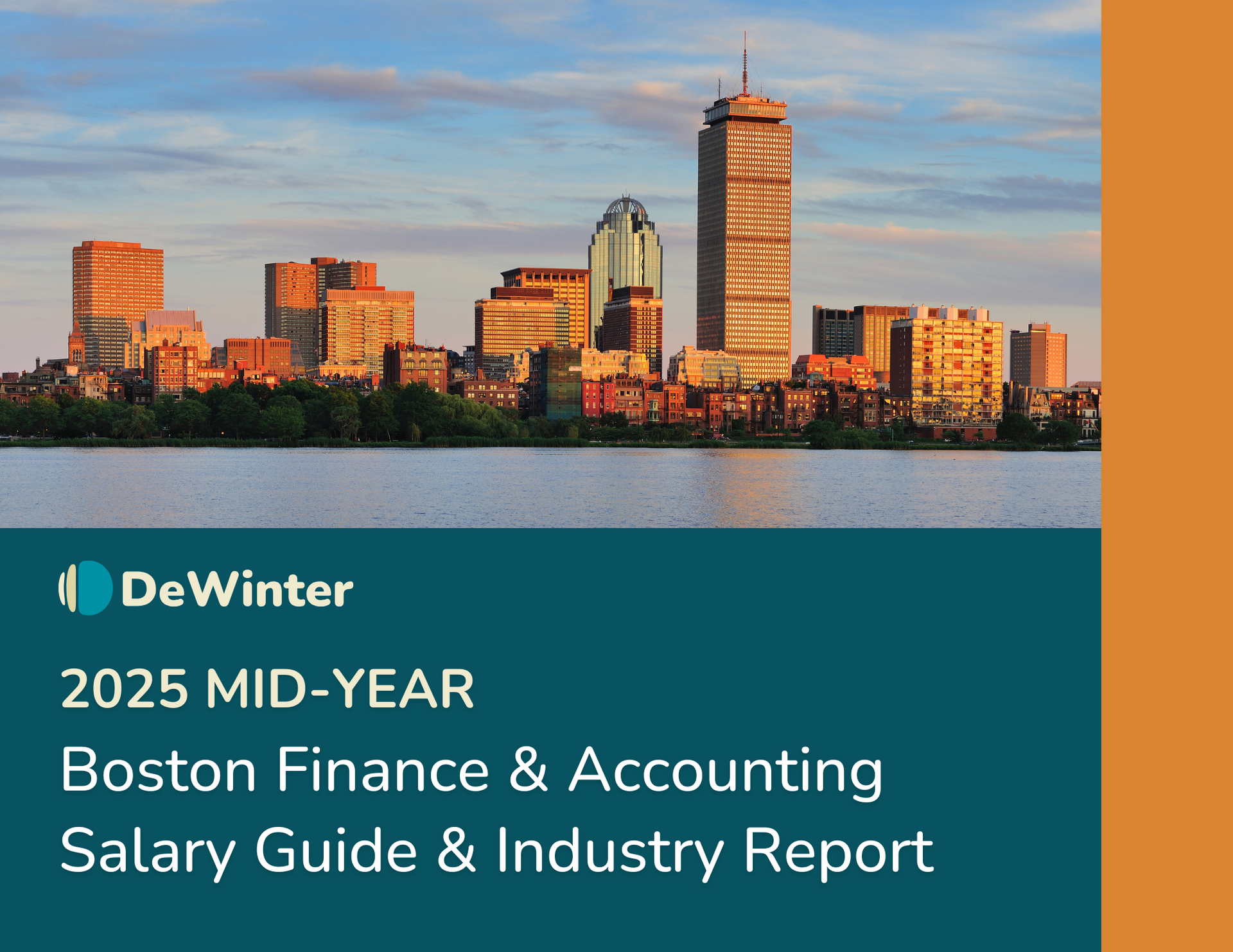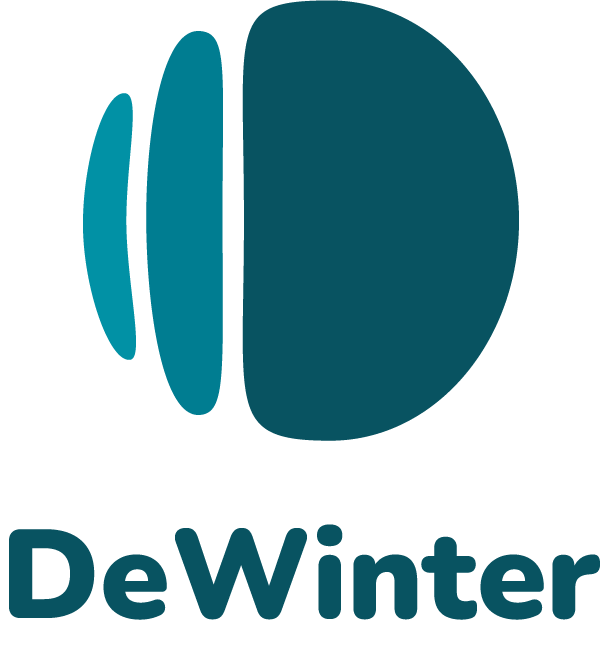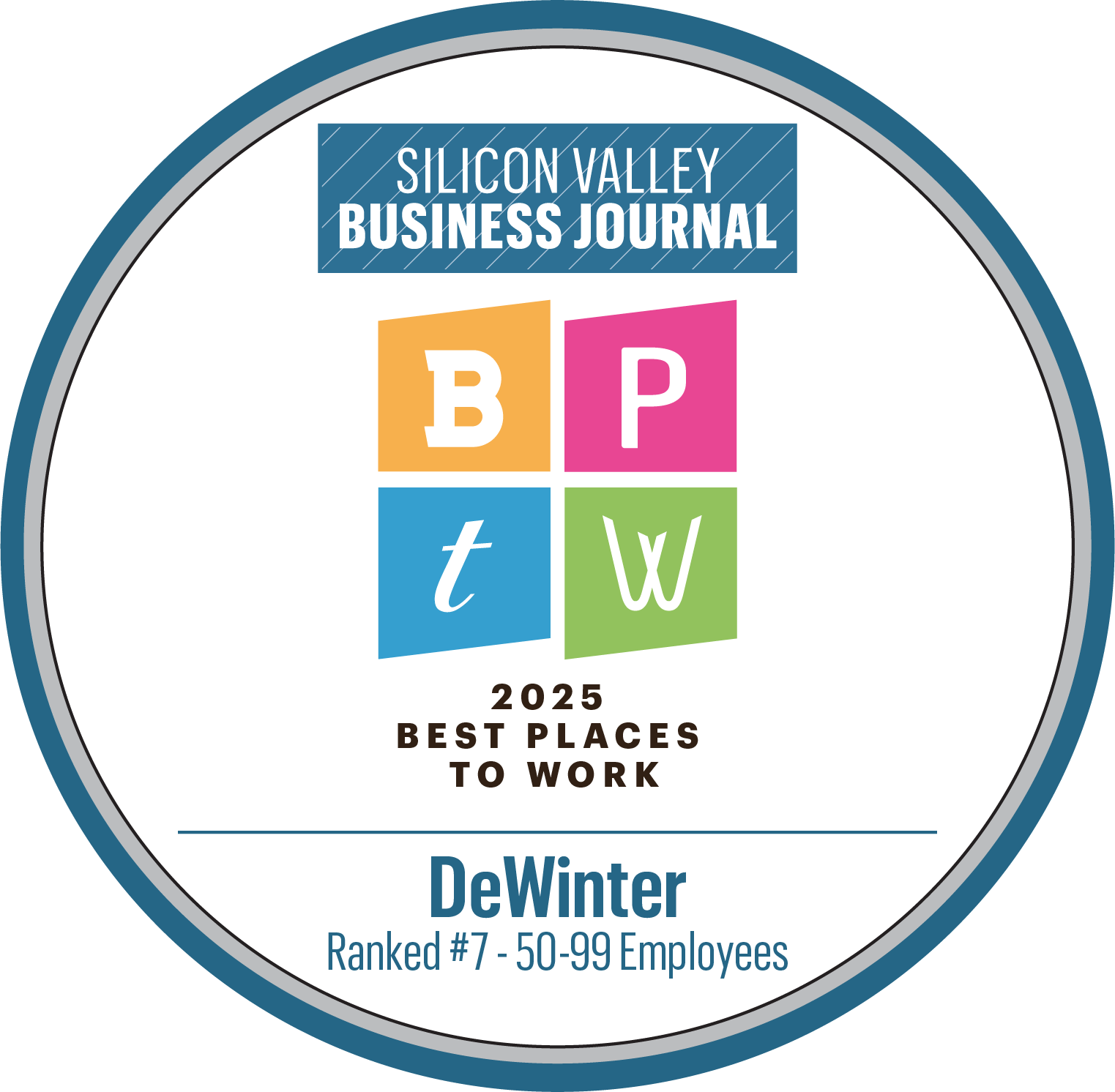About The Episode
In this episode of the DeWinter Difference, Derek sits down with Sheri Savage, Chief Financial Officer of Ultra Clean Technology. Hear from Sheri about her expansive career journey in hi-tech manufacturing and her long tenure with Ultra Clean Technology. Sheri and Derek discuss how career planning is different for today’s generation of early-career workers, her experience over the years as a female leader, the different skills needed for financial leaders as SAAS versus Hardware firms, and more.
Learn more about the DeWinter Difference podcast and share your thoughts and comments at DeWinterGroup.com/dewinter-difference
About Sheri Savage:
Sheri Savage has served as Ultra Clean Technology's Chief Financial Officer since July 7, 2016. Ms. Savage joined the company as the Senior Director of Finance in April 2009. Before joining UCT, Ms. Savage served at Credence Systems Corporation as Corporate Controller and Vice President of Finance and as Director of Internal Audit. Prior to Credence Systems, Ms. Savage held various accounting and finance roles at Protiviti and KLA-Tencor Corporation. Ms. Savage also served as Manager, Business Process Risk Accounting at Arthur Anderson LLP.
Ms. Savage holds a B.S. in Managerial Economics from the University of California, Davis.
About Ultra Clean Technology:
Ultra Clean Holdings, Inc. is a leading developer and supplier of critical subsystems, components, parts, and ultra-high purity cleaning and analytical services, primarily for the semiconductor industry. Under its Products division, UCT offers its customers an integrated outsourced solution for major subassemblies, improved design-to-delivery cycle times, design for manufacturability, prototyping, and high-precision manufacturing. Under its Services Division, UCT offers its customers tool chamber parts cleaning and coating, as well as micro-contamination analytical services. Ultra Clean is headquartered in Hayward, California.
Listen now at the streaming sites listed.
Learn more about the DeWinter Difference podcast here and share your thoughts and comments below.
Episode Transcript
This transcript has been edited for length and clarity.
Derek DeWinter: Welcome to our listeners who are tuning into the DeWinter Difference, an audio podcast where I spend a bit of time with incredible executives I've known for years, and you get to listen in. I hope that our conversations are unique, fun, insightful, and short enough to listen to driving from point A to point B, but long enough so that you can get some great takeaways that you can apply in your careers, lives, and relationships.
Today, I am very pleased to speak with my friend Sheri Savage, Chief Financial Officer of Publicly Traded, Ultra Clean Technology. Sheri has spent her career almost exclusively in high-tech manufacturing and contrary to a lot of what you see in Silicon Valley, she's spent the past 15 years at Ultra Clean Technology. We go back over 20 plus years and our conversation is long overdue as we haven't seen one another in a while. Sheri, I appreciate you tolerating me all these years and joining us.
Sheri Savage: Thank you for having me.
Derek DeWinter: Oh, absolutely, so let's return to my intro. You've been with UCT which we'll, you know, refer to as Ultra Clean Technology going forward for over 15 years and a CFO for over seven. As a search professional, it brings a big smile to my face as the average tenure for CFOs in the Bay Area is significantly shorter than that and what research I did ran anywhere from two and a half to four and a half years. So can you share your professional journey with us at UCT and what's kept you there all these years?
Sheri Savage: Yeah, absolutely, when I came in I was pregnant with my smallest child who's now almost 15. I came in thinking this is a nice company. I'll see how it goes and, 15 years later, I'm still here. I think part of it is having a lot of opportunities to move around and do different things within the company and the company's changed quite a bit. I think that makes a big difference as to why you would stay for a long time. I came in as a senior director of finance. They had a material weakness in inventory that needed to be fixed and just didn't have as much of the audit rigor that I had seen at other companies. That's why they brought me in as well as the FP&A side, didn't have as much talent on that as well. I had come in through a lot of the larger OEM semi-cap companies that had a lot more experience with that. As a result, they hired me, and I just slowly moved up the chain as I stayed there in the company.
The company changed quite a bit, allowing me to do different things. I have a lot of experience on the banking side and have done a couple of equity offerings as well as larger loans. I think the key thing is it allowed me to ultimately become CFO which I kind of looked at like that was just an awesome opportunity for me to take advantage of, and I've enjoyed it.
It's allowed me to expand my breadth of knowledge in finance as well as just as an executive leader. That's the reason why I've stayed in the company all these years.
Derek DeWinter: Well, you were promoted into the CFO position internally, I recently had an exchange with a different public company CFO who had an internal successor step into his seat. This is a pretty prominent company, it has over a hundred billion in market cap. So, you know, kind of a big deal type of company and a pretty significant transition. I ended up congratulating the amazing person who's now in the seat, but I also took time to congratulate the outgoing CFO who's still with the company. It spoke to the thoughtfulness, coaching, and strategic planning of not just that person, but of the organization on the whole, because internal promotions to CFO positions, I mean, I'd like to say that they're frequent, but they're not as frequent as I'd like them to be or see.
Given the multiple roles you've held at UCT, is this something you think about, you know, as you're in your seat and does that, does that promotion internally resonate with you more profoundly? Or am I making a bigger deal out of this?
Sheri Savage: No, absolutely, I think you know I always loved promoting people internally. I think if you can get the right people in the right jobs to be able to do that and also allow them to grow as they move through the company, that's quite key, to give the amount of experience for people that have the jobs that can grow into those roles. I find at least in my experience that they know so much more going into those roles than getting someone that is going to take six months to a year to come up to speed. When they come in, fresh into a company, not to say that you can't be successful doing that because I think you can, but I feel very thankful that I had the opportunity to know UCT before I got into that role.
I think it's a little scary stepping into a C-suite role when you haven't ever had one and knowing so much about the company allowed me to do a, I would say a better ramp-up of that because I didn't have as much experience on the investor side. I was mostly dealing with the internal operating role within the UCT.
In terms of running the business, the external side I didn't have as much experience with. So really, you know, having that internal experience helped with when I ultimately transitioned into dealing with the external side. I've tried to hire people in my organization who can succeed me. It's not a obviously 100 percent done deal at the end of the day but you know, it's a much better option to have someone you know have that experience and go up through the ranks as far as I'm concerned. So I think it's a great opportunity for someone.
Derek DeWinter: How much of your role has transitioned to be external versus internal?
Sheri Savage: Oh, it's humongous. When I first started, it was as a CFO, it was not my natural inclination to be dealing with the external side. So I had to kind of transition and that happened very quickly. I think over the years, more and more of my role has transitioned to dealing with investors as well as the banking opportunities that we've had. So it's transitioned quite a bit I still know enough to be dangerous within the operations and everything, but I'm not in the middle of the details as much as I used to be.
I really had to cognizantly step back and not be in the middle of everything and let the people below that work for me you know, that is probably much better at it than I am at this point, especially because they're running things day to day, but I really had to step back and allow them to be able to do that, obviously I help guide them and, and give them my insight, my history, but you know I've really had to completely shift my focus and be more strategic and really help the CEO more run the company versus be in the middle of every single little thing day to day.
Derek DeWinter: It's funny how, as you transition over the course of your careers, and I've had to deal with this myself too, is, you know, you're pretty proficient at the things that you have to give up. That can be a hard thing to do, you know, you've got to sever a lifeline to the things that were comfortable to you, that you were very good at, that people counted on you for. And counted on you to produce and manage. It almost takes a significant intentionality to make that transition go well. If you hang on to it for too long, people don't feel like you're giving them the opportunity. That certainly impacts your ability to step into your new role and be successful too, it's tricky.
Sheri Savage: Agree it's a hard transition for many people. I find that and I've seen it with certain roles where they just, they work 24/7 and they don't delegate down and it's just, they're not successful. Their people aren't successful.
I'm a big believer that it can take some time to transition into that, but I think it makes a big difference for the whole organization to be able to you know, continue to grow people within it so that they, you know, are able to run more detail and more day to day stuff versus like some of the, you know, higher level executives. I think it's a hard transition, but it definitely is a good thing.
Derek DeWinter: Yeah, so we couldn't have a conversation without using the term AI or SaaS. It is all the rage. But the last time I checked we still make physical products that are the foundation of all of those SaaS software and AI things. You are a hardware CFO, although you probably wouldn't want to be labeled such. I apologize for saying that, but you certainly have a great skill set in the area.
Do you see a significant difference in the skills of a SaaS versus hardware, CFO and what are some of the things that you think you likely think more about in your role at UCT than somebody might at, you know, x, Y, Z software or AI company?
Sheri Savage: Yeah.
Derek DeWinter: Maybe that's an unfair question because you're not there, but you have conversations with others, you know colleagues in the marketplace. So I'm curious.
Sheri Savage: Absolutely, I get asked about AI all the time, especially when I talk to investors and how that role plays in our company. But you know, I would say that, fundamentally, I think a lot of things in finance are very similar. There's obviously revenue recognition, and certain things are, are somewhat different. I think the strategies surrounding SaaS and AI with their subscriptions and selling software are much, much different. You know, I think one of the things that is very important to a SaaS or AI company, but for us you know, for a hardware company, one of the key things is working capital management that you have to pay attention to as well as, you know, capital expense that you are trying to manage.
I am managing large numbers of inventory, not me specifically, I'm not in the warehouse, but, you know, we're managing the overall capital and cash needed to manage that, that's pretty heavy in a hardware company compared to, you know, a SaaS company. I think the other thing is just the capital structure that you have to have in place to be able to have all these factories and the specific people associated with that.
That's also something that's very different from say a software company. I do think you can travel between the two. I think it's always a good thing to have a different perspective, especially as board members who are in different companies that have the software component as well as the hardware, but I think the working capital is probably the biggest difference between the two that I see at this point.
Derek DeWinter: For those non-finance people out there, that's the balance
Sheri Savage: Yes.
Derek DeWinter: You think about that probably more. Well, I won't say that. I will say it anyway. You probably think about it significantly more than most CFOs do at other companies because it's such a critical part of being able to look around those corners. Like, if you're not on top of that, you cannot plan for 6, 9, 12, or 18 months
Sheri Savage: Absolutely.
Derek DeWinter: Yeah, I mean, UCT is uniquely international. Most of the companies in the Bay Area technology companies are international, but you have a footprint that is significantly international with manufacturing customers, and operations.
You started your career at UCT 15 years ago, but have been in the CFO position for over seven years.
Can you comment on what it's like to be internationally, in the markets that you're in I imagine, it’s just you know the elephant in the room, a C-suite female executive traveling to places that I assume could be a little bit difficult. How have you navigated that? Or am I incorrect in assuming that there have been any uniquely difficult experiences?
Sheri Savage: You know I would say that I haven't had anything that has been, more uniquely difficult at UCT. Maybe it's because I grew up in the organizations and I had a lot of credibility within different locations as I've been here so long. I think I probably saw it more earlier in my career you know, especially when I was doing the Arthur Anderson days at multiple companies. I can recall going to Japan and some of my male counterparts didn't even want to speak to me or being the only woman in the room when I did presentations back when I worked at different companies and felt very kind of weird about that.
I think as I've gotten obviously a lot more confidence in my ability as well as, you know, my career's grown a lot. I really just don't even think about it anymore. It's kind of a weird thing and maybe it's the position that I'm in. I could see where, you know, some women in lower positions would definitely feel that difference, but luckily I really have not at UCT. I think we've always tried to harbor a really open and diverse company I'm hoping that most everyone doesn't feel any impact to that.
At one point I had started a women’s group you know, kind of didn't do as well during COVID. But I really try to harbor that as a woman, you really need to take your power and be present and be there and you're right at the table with everybody else.
So hopefully I think my presence as an executive there gives some insight to other women that you can continue to move up and you can have a big job. It's just not any different being a woman versus a man.
Derek DeWinter: What would, on that note of diversity, would you tell your younger self about how we've done in the last 25 or so years in corporate America as it relates to creating really diverse organizations? And in sharing your thoughts, if you would imagine being that 25-year-old self, would she be surprised to know that we've come this far or would she be disappointed we haven't come further?
Sheri Savage: Oh, she'd be completely surprised. She's come this far
Derek DeWinter: Hmm.
Sheri Savage: Which is I think a good thing, you know, I mean I always was a big believer that you know I would take opportunities as they came. I really didn't manage my career crazily as I think, you know, kids today probably need to come out of college, they probably have to manage it far more than we did when we started. You know, I think I'm amazed at where I've come to. I feel so lucky, you know, for the opportunities that I've been given you create your luck but along the way, I've been in the right place and I've met the right people. I think I'm truly blessed and ecstatic with the things that I've accomplished and the people that I've worked with and friends along the way I couldn't do it without any of them. I feel like it's been a great experience
Derek DeWinter: That's awesome. On that note, what might you be doing if you weren't in the senior leadership CFO role you're in?
Sheri Savage: Oh boy, there's probably multiple things that I could do. I'm really big into fitness. I would probably have a lifestyle-type business, you know, whether it be as a CFO or, or something in a lifestyle business would probably suit me well.
If I were going to completely off the wall, I would probably be more of an event planner or wedding planner. I tend to be very organized and process-driven. So I've built several houses and had to keep those organized. So that's something that I enjoy. These projects are where you're either building something or building something physically. I think that's kind of my deal as much as if I weren't, you know, doing my current job.
Derek DeWinter: Good stuff. I don't envy the project stuff. Like, certainly any house remodel I've thought about doing, like, oh my gosh.
Well, I tell you what, you have been so good at answering all of my questions, this is the time of our little conversation where I get to turn it over to you. And you get to ask me a question, unscripted, that I don't have any clue what is. So hopefully you'll be kind and nice.
Sheri Savage: Of course. Yeah. No, you know, you asked me about AI before, and I'd love to know from your standpoint, because you've been a longstanding recruiter in the valley, like how you think AI is going to take on a broader role, both from a recruiter standpoint, as well as like the employee experience. Do you think that's going to have any impact as it continues to grow?
Derek DeWinter: Oh, boy recruiter's experience we talk about it all the time. We certainly are building practices around it, both in our consulting practice, as well as our search practice that has, kind of, some focus in that area. It's relatively, I mean, it's relatively new, but AI is not only a year old. It's been around for a little bit longer, but the amount of money, resources, and attention that it's getting is going to force all of us to think about it differently. Even UCT, which is, you know, a hardware company, and think, Oh, how's AI going to impact your products you get asked about it just the same as companies in the social media space.
We think about it a lot and we are gearing our business towards being able to answer those questions in the marketplace from an employee experience perspective. I'm super conflicted on that. I mean, I don't go a day without hearing something about Chat GPT, and I did this in two minutes, or I did this in five minutes, what took me a day, and I think doing things easily can sometimes get in the way of the experience of doing the thing. The connections that happen while you're in the process of building out a project, or building out a tool, or building out a spreadsheet, or building out a, you know, an agenda.
I think we will lose a lot of those conversations, despite the efficiencies of the end product. So, I have concerns with that a little bit, I have concerns as a parent too.
I've got two, I've got two, 20-year-olds and a 17-year-old boy, things are going to be a whole lot different for them and already are. In even the two years that my kids have been in college. They know how the professors go about, you know, teaching classes, grading classes, and, you know, the animus that is created between students who know one's doing one thing authentically and the other thing, the other one's not so it's complicated.
Sheri Savage: Yeah. No, I agree with you. I agree with you 100%.
Derek DeWinter: Yeah, so I look at it through a couple of different lenses and, currently the lens that I'm more concerned about is the personal how that is going to truly impact, you know, our kids and our communities and our connections to one another.
So, I don't know. I hope I'm not being the old guy on the lawn who says, get off my lawn, but I sort of feel like that a little.
Sheri Savage: No, I agree with you.
Derek DeWinter: Final question for you and then I'll let you rush off to do your real job. I hope you've seen the movie the Barbie movie. Did you like it?
Sheri Savage: Oh, I loved it. I didn't dislike anything about the movie. I watched it with my husband that part where America Ferreira does her kind of diatribe about being a woman. I teared up because I was like, Oh my gosh, I understand this. This is like, you know, it's, you know, although I have not had major impacts with being a woman at UCT, but you still feel certain things along the way in life.
It's just, oh my gosh, it resonated with me in a very big way. So I think it was a great movie from a messaging perspective. I think we need more of that out in the marketplace. I told my daughter, you have to watch it. So I think it's a really good message. I resonated with many things that were said in it.
Derek DeWinter: That was one of the best two-minute speeches of all.
Sheri Savage: Yes, totally agree.
Derek DeWinter: Just like, oh my gosh. I wonder how many takes it took to do that. It feels like she probably could have done that without a script just drawing on experiences or whatever. Like, I don't need your script, I got this!
Sheri Savage: Oh, I agree.
Derek DeWinter: Well, look, it was so great to catch up with you and you're so generous with your time to be able to spend with us.
I hope everyone who's listening to this enjoyed it. I do hope that our paths cross this summer somewhere, somehow, and continued success in your role as an executive, a mother, a wife, and a member of our community.
Sheri Savage: Thank you. Appreciate it.

